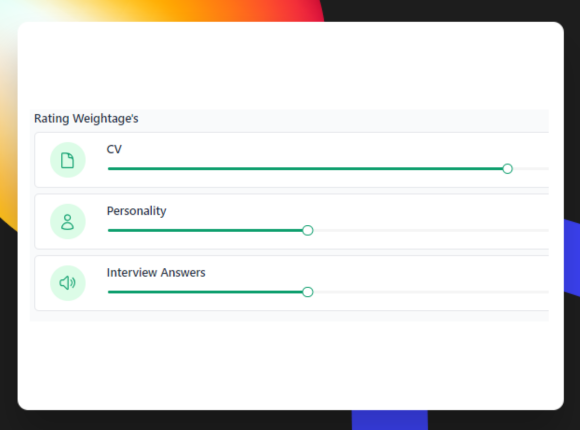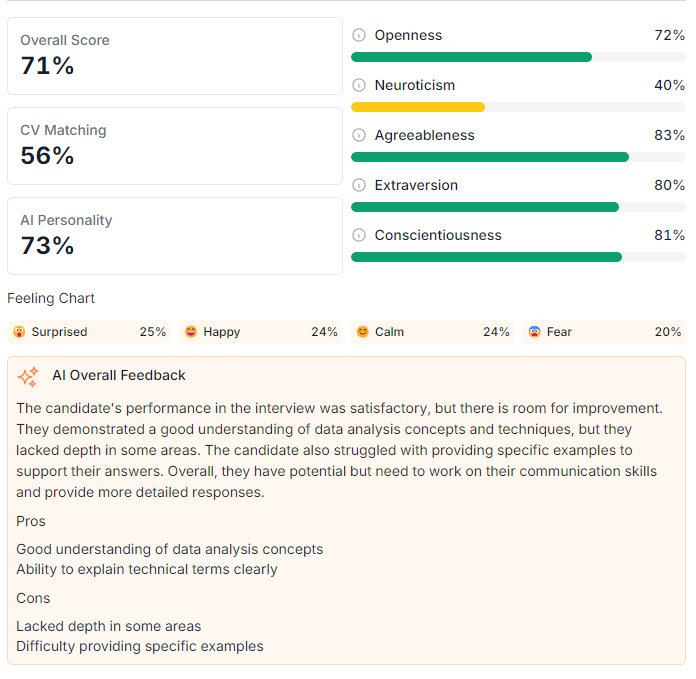- Make data-driven hiring decisions using Qureos' AI, which analyzes verbal and non-verbal cues to provide objective candidate assessments.
- AI video interviews can reduce time-to-hire by up to 50%, helping recruiters screen candidates more efficiently.
- Reduce bias in recruitment: Companies using AI tools for interviews report a 30% reduction in hiring bias, focusing more on candidates' skills and qualifications
What is an AI Video Interview?
AI Video Interview, also known as an asynchronous or on-demand interview, is a highly sought-after recruitment tool that uses artificial intelligence to screen candidates. Shortlisted candidates answer pre-determined questions on camera, and AI technology assesses their responses and gives insights about their suitability for any job role. This method aims to streamline the hiring process by efficiently evaluating many candidates and identifying those who may be a good fit for the job.
In this comprehensive guide on AI video interviews, we’ll dive deep into understanding what they are and how they’re helping recruiters hire the best candidates faster.
Also read: How to reduce time-to-hire and time-to-fill?
How do AI Interviews Work?
In AI video interviews, candidates typically face a set timeframe to respond to predetermined questions. Each response has an assigned time limit, and candidates often have the chance to make multiple attempts to record their answers.
Once the process is finalised, the recruiter gains access to the recorded interview, allowing for the playback of candidate responses. When a candidate answers questions on camera, the technology uses special steps to understand and analyze their responses. First, the candidates' words are translated so the AI can work with them.
Then, using Natural Language Processing (NLP), it examines the text to determine what the candidate is saying and understands the meaning. Using sentiment analysis, the AI also checks whether the candidate's expressions seem positive, negative, or neutral. It looks at the structure of the candidate's language, like how they put sentences together and their facial expressions and body language.
Also read: Ways to reduce cost-to-hire
How to Use Qureos' AI Video Interview Feature
Qureos' AI video interview feature offers advanced AI-driven tools to automate and streamline the interview process. Recruiters can choose from three methods to set up AI interviews
Step #1 Get Candidates
a. Source candidates using Iris:
Use the Iris tool to find and shortlist candidates. You can then add them to the AI video interview process for further evaluation.
b. Upload a job on Qureos:
Receive candidates from external job boards, shortlist them, and then add them to the AI video interview stage.
c. Upload your talent pool:
If you already have a database of candidates, you can upload your talent pool to Qureos and add the candidates to an AI video interview.
Each method allows recruiters to fully customize the interview process, leveraging AI to analyze candidate responses, evaluate skills, and improve decision-making.
Step #2: Add your Questions:
Select or customize interview questions relevant to the job role.
.png)
Step #3 Setup AI Personality Criteria
Define the personality traits and skills you want the AI to assess.
.png)
Step#4 Assign Weightages
Set up how the AI will score candidate responses based on various factors such as CV, personality, and interview answers.

Step#5 Preview
Review the setup and ensure everything is configured correctly before proceeding.
.png)
10 Common AI Video Interview Questions
Typically, an AI video interview is used for the initial recruitment phase to shortlist the top candidates who will best fit the role, so it’s generally kept relatively short. In interviews where candidates respond to pre-recorded questions, each question has time limits, ranging from 1 to 5 minutes per response. Here are some examples of pre-recorded questions that can be used in AI video interviews:
[fs-toc-omit] 1) Introduction and Background
Briefly introduce yourself and tell us about your background and experience.
[fs-toc-omit] 2) Job-Specific Skills
Describe a situation where you successfully applied [specific skill relevant to the job].
[fs-toc-omit] 3) Problem-Solving
Can you share an example of a challenging problem you faced at work and how you resolved it?
[fs-toc-omit] 4) Adaptability
How do you handle changes or unexpected challenges in your work environment?
[fs-toc-omit] 5) Teamwork
Provide an example of a project where you collaborated effectively with a team.
[fs-toc-omit] 6) Communication
Explain a complex idea or project you worked on, making it understandable to someone without your expertise.
[fs-toc-omit] 7) Cultural Fit
How would you describe your work style, and how do you think it aligns with our company culture?
[fs-toc-omit] 8) Motivation and Interest
What attracted you to this role and our company, and how do you see yourself contributing?
[fs-toc-omit] 9) Problem-Solving (Technical Roles)
If you encountered a technical challenge you hadn't faced before, how would you approach solving it?
[fs-toc-omit] 10) Feedback on the Interview Process
What did you think of this interview process, and is there anything you'd suggest to improve it?
These questions cover a range of skills and traits, helping recruiters assess candidates' qualifications, problem-solving abilities, teamwork, adaptability, and cultural fit. Recruiters can customize these questions based on the specific requirements of the job and the organization.
Also read: The best sourcing strategies
5 Tips for Crafting AI Video Interview Questions
1. When making questions for AI video interviews, think about what's needed for the job. Ask questions that directly check if the person has the right skills and fits the company's work.
2. Mix it up by including different questions to see various skills like problem-solving and how well they fit with the team.
3. Keep questions easy to understand and fair for everyone, so it's not confusing or incorporate bias.
4. Make sure the questions engage people and get them thinking. Also, don't make the questions too long – keep it reasonable.
5. Lastly, ask for feedback to make things better next time.
Also read: How to screen candidates?
How does AI score candidates in video interviews?
AI scores candidates based on metrics like language patterns, emotional tone, facial expressions, and how well their responses align with the job requirements.
Qureos’ AI scores candidates in video interviews by evaluating multiple aspects of their responses. The AI analyzes verbal answers using Natural Language Processing (NLP) to understand content and structure, while sentiment analysis evaluates the emotional tone of their responses. Additionally, it assesses non-verbal cues, such as facial expressions and body language, to provide deeper insights into a candidate’s personality and communication style. These elements are combined into a comprehensive score that helps recruiters compare candidates objectively and make data-driven decisions.

What are the Features and Components of AI Interviews?
AI video interview software includes features that facilitate the interview process and provide valuable insights into candidate suitability.
[fs-toc-omit] Question Library
Use relevant questions for multiple competencies like adaptability, Analytical Thinking, Building Relationships, etc.
[fs-toc-omit] Candidate Outreach
Send a cold email or LinkedIn message to shortlisted candidates to invite them to take the interview.
[fs-toc-omit] Video Recording and Playback
Allows candidates to record their responses to interview questions and for recruiters to review and play back these recordings.
[fs-toc-omit] AI-Driven Analysis
Get data-backed, analytical insights into candidate responses through textual and AI sentiment analysis tool.
[fs-toc-omit] Candidate Scoring
Analyse interview performance based on CV Scoring, AI Personality Scoring, and Answers Scoring score candidates based on their performance and suitability for the role.
[fs-toc-omit] Integration with ATS (Applicant Tracking System)
Streamline recruitment workflow with seamless integration with ATS platforms that ensures consistency in candidate data.
[fs-toc-omit] Security and Compliance
Comply with privacy regulations and industry standards to ensure the security and confidentiality of interview data
[fs-toc-omit] Feedback and Reporting
Generate detailed reports and analytics on candidate performance, interview completion rates, and other relevant metrics.
What are the Benefits of AI Interviews for Employers?
AI Video interviews are revolutionizing the hiring process in multiple ways, but are they worth it? Here are some of the benefits to help you reach your own conclusion.
[fs-toc-omit] Reduce Time to hire
AI video interviews allow hiring managers and recruiters to automate the initial screening, so they don’t have to individually interview each candidate and assess whether they fit the role.
[fs-toc-omit] Make Data-Backed Decisions
The AI gathers and analyzes data, allowing you to make more informed decisions based on candidates' performance metrics. In a world where data is king, recruiters can leverage AI to make more informed decisions that help the company's bottom line.
[fs-toc-omit] Be More Objective During the Hiring Process
Since the interview process is standardized, it minimizes unconscious biases that may influence traditional interviews and allows recruiters to reach an objective conclusion. This also means there’s less time spent deliberating on the decision, especially when multiple decision-makers are involved.
[fs-toc-omit] Get Access to More Candidates
Eliminates geographical constraints and scheduling conflicts, allowing recruiters to conveniently assess candidates from different time zones.
[fs-toc-omit] Assess Candidates Holistically
The Al algorithm thoroughly analyzes candidates' communication abilities, emotional intelligence, and qualifications. It assesses facial expressions, language patterns, and non-verbal cues, providing objective insights into candidate suitability.
[fs-toc-omit] Improve Collaboration and Convenience
It allows you to share interview recordings, gather feedback from multiple team members, and ensure a comprehensive evaluation. It also makes the interview process candidate-friendly because they can respond at their own pace.
[fs-toc-omit] Embrace the AI Revolution
Embracing AI video interviews means you’re committed to modernized recruitment practices, and puts you at the forefront of innovative hiring methodologies.
AI Video interviews are not just a trend – they are the future! Companies that embrace this transformative recruitment process will gain a competitive advantage by reducing the time to hire significantly. It also signals a future where recruiters are normalizing data-backed decision-making, ensuring better, equitable hiring practices.
Learn more about Qureos' AI video interview feature and optimize your recruitment process today by scheduling a demo today!
FAQs:
How can I automate candidate interviews using AI?
You can automate interviews by using AI tools like Qureos to set pre-determined questions, record candidate responses, and have the AI analyze their answers. This eliminates the need for manual screening and shortlisting, making the process faster and more efficient.
How accurate is AI in assessing candidates' communication skills?
AI is proficient at analyzing communication skills, evaluating factors like tone, clarity, and content structure. However, it should complement human evaluation to ensure accuracy, especially for roles requiring advanced communication abilities.
Can AI video interviews replace face-to-face interviews?
AI video interviews are typically used for initial screening and are not meant to replace final, face-to-face interviews, especially for senior roles. They are highly effective in narrowing down top candidates early in the hiring process.
How can AI improve the candidate experience during the interview process?
AI video interviews offer flexibility, allowing candidates to complete the interview on their own time. This eliminates scheduling conflicts and provides a smoother, more candidate-friendly experience.
Can AI interview tools integrate with my ATS?
Yes, most AI interview tools, including Qureos, integrate seamlessly with Applicant Tracking Systems, allowing you to streamline the interview process and manage candidate data in one place.
How does AI improve decision-making in the hiring process?
Qureos improves decision-making in the hiring process by providing AI-powered insights through features such as candidate scoring, which evaluates communication, emotional intelligence, and job-specific skills. It uses Natural Language Processing (NLP) and sentiment analysis to assess responses, and non-verbal cue analysis (like facial expressions and body language).




